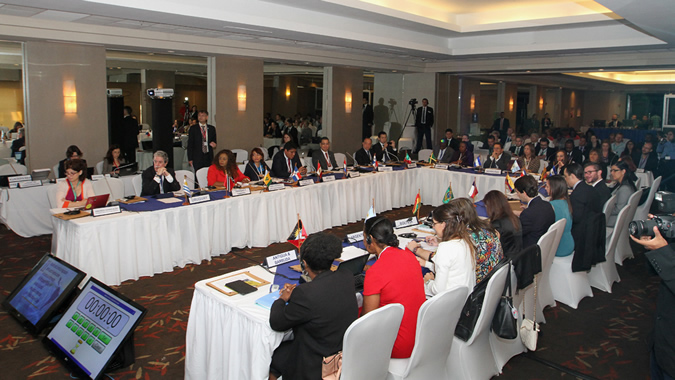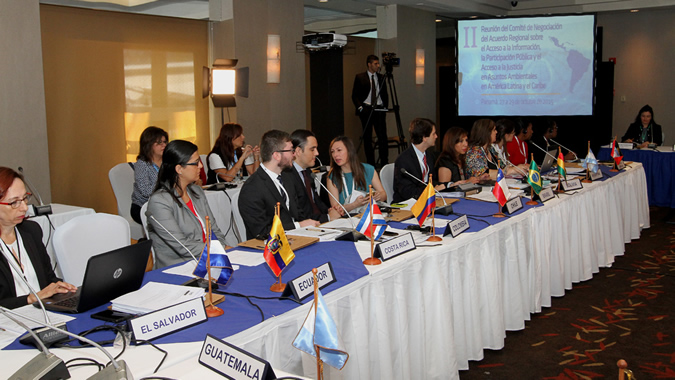The Region Can Be a Global Example if it Achieves Agreement on Rights of Access in Environmental Matters
Work area(s)
The second meeting to negotiate a regional instrument on access to information, public participation and justice in environmental matters began on Tuesday in Panama.

Latin America and the Caribbean have today a unique opportunity to become an example before the world on the application of rights of access to information, public participation and justice in environmental matters, authorities and experts gathered in Panama said.
At the opening of the Second Meeting of the Negotiating Committee of the Regional Agreement on Access to Information, Public Participation and Justice in Environmental Matters in Latin America and the Caribbean (Principle 10 of the Rio Declaration on Environment and Development), organized by the Economic Commission for Latin America and the Caribbean (ECLAC) and the government of Panama, representatives from more than 20 countries, international organizations and civil society highlighted their willingness to contribute to a regional instrument that guarantees the rights of access in environmental matters.
“We have taken a civilizing step with the adoption of the 2030 Agenda for Sustainable Development. The balanced integration of the economic, social and environmental aspects is fundamental in guaranteeing an environmentally sustainable future. Access to information, participation and justice is more relevant than ever considering that it deepens our democracies and enables reducing global and local asymmetries,” Alicia Bárcena, ECLAC’s Executive Secretary, said in a video message (in Spanish) broadcast at the beginning of the meeting.
The gathering, which will last until Thursday, October 29 gives continuity to the work begun at the first meeting of the Negotiating Committee, held in Santiago, Chile last May. The delegates will negotiate substantive aspects of the regional agreement, included in a preliminary document prepared by ECLAC.
Jose Luis Samaniego, Director of ECLAC’s Division of Sustainable Development and Human Settlements, emphasized that the results of this process will contribute to the recently approved 2030 Agenda for Sustainable Development, considering that Principle 10 is at the center of the 17 goals and 169 targets agreed last September by the United Nations’ member states.
Max López, Director General for International Organizations and Conferences of the Ministry of Foreign Affairs of Panama, said that “we are in the face of an historic opportunity” to advance towards a regional agreement “which will strengthen the democratic institutions and the freedom of expression, as well as the rest of human rights in each of our countries.”
In her participation, Panama’s Minister of Environment, Mirei Endara, said that as Principle 10 of the Rio Declaration consecrates “the best way of dealing with environmental matters is with the participation of all interested citizens.”
Endara also reaffirmed the interest of her government for the regional agreement coming out of this process to be binding, in order “for it to be based in this way on the wonderful legacy the Rio Declaration - the maximum international environmental and declaratory instrument of our times - has left us, and start traveling new paths, inspired by our wish to ensure a healthy environment for all our populations.”
In the opening ceremony the presentations by Danielle Andrade and Sonia Montenegro, representatives of the public, were also heard. They thanked ECLAC, in its role as technical secretariat of this process; the government of Panama, as host of this second meeting; and the participating countries and civil society organizations, for their commitment to carry out the negotiation of the regional agreement.
Related content


In Panama Countries Conclude Second Round of Negotiations for Agreement on Rights of Access in Environmental Matters
The third meeting of the negotiating committee on the regional instrument will take place in April 2016 in Uruguay.
Related link(s)
Country(ies)
- Latin America and the Caribbean
Contact
Public Information Unit
- prensa@cepal.org
- (56 2) 2210 2040